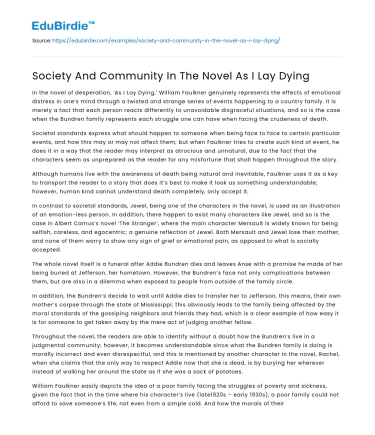In the novel of desperation, ‘As I Lay Dying,’ William Faulkner genuinely represents the effects of emotional distress in one’s mind through a twisted and strange series of events happening to a country family. It is merely a fact that each person reacts differently to unavoidable disgraceful situations, and so is the case when the Bundren family represents each struggle one can have when facing the crudeness of death.
Societal standards express what should happen to someone when being face to face to certain particular events, and how this may or may not affect them; but when Faulkner tries to create such kind of event, he does it in a way that the reader may interpret as atrocious and unnatural, due to the fact that the characters seem as unprepared as the reader for any misfortune that shall happen throughout the story.
Save your time!
We can take care of your essay
- Proper editing and formatting
- Free revision, title page, and bibliography
- Flexible prices and money-back guarantee
Although humans live with the awareness of death being natural and inevitable, Faulkner uses it as a key to transport the reader to a story that does it’s best to make it look as something understandable; however, human kind cannot understand death completely, only accept it.
In contrast to societal standards, Jewel, being one of the characters in the novel, is used as an illustration of an emotion-less person. In addition, there happen to exist many characters like Jewel, and so is the case in Albert Camus’s novel ‘The Stranger’, where the main character Mersault is widely known for being selfish, careless, and egocentric; a genuine reflection of Jewel. Both Mersault and Jewel lose their mother, and none of them worry to show any sign of grief or emotional pain, as opposed to what is socially accepted.
The whole novel itself is a funeral after Addie Bundren dies and leaves Anse with a promise he made of her being buried at Jefferson, her hometown. However, the Bundren’s face not only complications between them, but are also in a dilemma when exposed to people from outside of the family circle.
In addition, the Bundren’s decide to wait until Addie dies to transfer her to Jefferson, this means, their own mother’s corpse through the state of Mississippi; this obviously leads to the family being affected by the moral standards of the gossiping neighbors and friends they had, which is a clear example of how easy it is for someone to get taken away by the mere act of judging another fellow.
Throughout the novel, the readers are able to identify without a doubt how the Bundren’s live in a judgmental community; however, it becomes understandable since what the Bundren family is doing is morally incorrect and even disrespectful, and this is mentioned by another character in the novel, Rachel, when she claims that the only way to respect Addie now that she is dead, is by burying her wherever instead of walking her around the state as if she was a sack of potatoes.
William Faulkner easily depicts the idea of a poor family facing the struggles of poverty and sickness, given the fact that in the time where his character’s live (late1920s – early 1930s), a poor family could not afford to save someone’s life, not even from a simple cold. And how the morals of their community worked, since nobody would help them, regardless of how many times they explained the reason why they were fighting so hard on keeping their promise.
William Faulkner clearly demonstrates deserving his Nobel Prize, and correctly illustrates the society and type of communities he was exposed to when growing up.






 Stuck on your essay?
Stuck on your essay?

